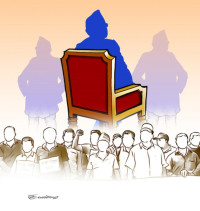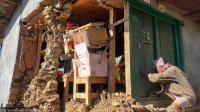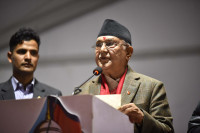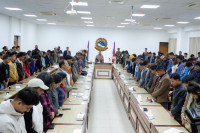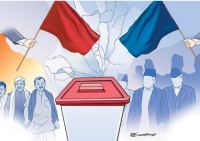Opinion
Terrified students
Schools are overburdening small children with work to appear modern and standard
Meghraj Rasaili
Five-year-old Priyansu, a close relative of mine, was crying while memorising the multiplication table of eight. She had to memorise the table because she had a class test the very next day. If she failed or got low marks, she would be punished. Her mother was helping her, and she was not happy with the school for burdening a child with such a heavy load of assignments. Priyansu studies in grade one in a private school in Itahari, my home town. She goes to school carrying a heavy bag of books, does a lot of class work during school hours and returns home with heaps of homework. Her routine has compelled me to think seriously about the teaching methodology practiced in most schools. How is the multiplication table of eight useful for a five-year-old? Does she know what she is reading? Many questions came to my mind as I pondered the issue.
My five-year-old son is also studying in grade one. In stark contrast, he is just studying the multiplication table of four. He does not need to memorise English word meanings or pages of books. Whatever he is learning, he is doing it by singing and playing in a pleasant environment. Many children like Priyansu are studying in an environment of fear while a few lucky children like my son, who is studying in Kathmandu, are learning with fun.
Money making tools
Most private schools want to be the best, which is not a bad thing. But it would be bad if they are making their students suffer to achieve that aim. One of my close relatives was telling me that his son’s school was very good because discipline was strict and special tuition was offered after regular classes. Like him, many parents are happy when their children write or read ‘big things’ and they become the school’s unofficial ‘brand ambassador’ telling everybody to enrol their children there. My nephew studies in grade eight in Itahari and is the brightest boy in his class. He is anxious due to the heavy pressure of schoolwork. “The teachers come to the classroom carrying a big stick. I can’t concentrate on my books due to fear,” he said.
I was in Jajarkot for a week last February where I lived in a hotel. The proprietor’s four-year-old son would cry every morning when it was time to go to school, and his mother had to drag him out of the house. Barely an hour later, he would return, having run away from school, and play in the courtyard. This child was being forced to write A, B, C, D and 1, 2, 3 in school. His mother said that he had been beaten by his teacher many times for bunking classes.
These examples compel me to think that school children are being treated barbarically. They are parroting text which they don’t understand, and memorising multiplication tables they have no use for. Why are schools forcing children to learn unnecessary things which is robbing them of their childhood? Do they want to earn a good reputation by standing on the small heads of their child students? What is all this for? To make money? If so, this is an unpardonable crime against children. I am not saying that all the private schools are the same, but there are many that are teaching children in a coercive environment.
Child rights in school
The United Nations Convention on the Rights of the Child has prohibited all forms of violence, abuse and neglect which disrespect the child’s dignity. The children whom I mentioned earlier are not enjoying their rights. They do not know about their rights, but their teacher should know about them. If a school is not respecting the children’s human rights, the government should intervene. The UN convention says that the government must ensure that school administrators review their discipline policies and eliminate any discipline practices involving physical or mental violence, abuse or neglect. In addition, corporal punishment in school is banned by law in Nepal, but violations of child rights in school have not stopped.
As long as schools continue using coercive learning methods, children will not go to school happily. Schools need to evaluate their past and make a new strategic plan for the future. Schools should make a public commitment that their teachers will not carry a stick into the classroom, no student will be abused physically or mentally, all forms of violence will be eliminated, and the voice of the children will be heard and their dignity will be respected. Teachers should help to establish a friendly relationship between books and kids. If they force babies to read books they do not understand, naturally they will cry when it is time to go to school.
Rasaili is a Kathmandu-based journalist




 15.12°C Kathmandu
15.12°C Kathmandu
